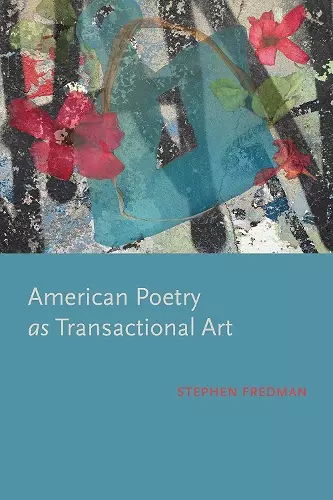American Poetry As Transactional Art
Format:Paperback
Publisher:The University of Alabama Press
Published:2nd Jun '20
Should be back in stock very soon

Explores the ways American poetry engages with visual art, music, fiction, spirituality, and performance art.
Many people think of poetry as a hermetic art, as though poets wrote only about themselves or as if the subject of poetry were finally only poetry - its forms and traditions. Indeed much of what constitutes poetry in the lyric tradition depends on a stringently controlled point of view and aims for a timeless, intransitive utterance. Stephen Fredman's study proposes a different perspective.
American Poetry as Transactional Art explores a salient quality of much avant-garde American poetry that has so far lacked sustained treatment: namely, its role as a transactional art. Specifically Fredman describes this role as the ways it consistently engages in conversation, talk, correspondence, going beyond the scope of its own subjects and forms - its existential interactions with the outside world. Poetry operating in this vein draws together images, ideas, practices, rituals, and verbal techniques from around the globe, and across time - not to equate them, but to establish dialogue, to invite as many guests as possible to the World Party, which Robert Duncan has called the 'symposium of the whole.'
Fredman invites new readers into contemporary poetry by providing lucid and nuanced analyses of specific poems and specific interchanges between poets and their surroundings. He explores such topics as poetry's transactions with spiritual traditions and practices over the course of the twentieth century; the impact of World War II on the poetry of Charles Olson and George Oppen; exchanges between poetry and other art forms including sculpture, performance art, and ambient music; the battle between poetry and prose in the early work of Paul Auster and in Lyn Hejinian's My Life. The epilogue looks briefly at another crucial transactional occasion: teaching American poetry in the classroom in a way that demonstrates that it is at the center of the arts and at the heart of American culture.
In American Poetry as Transactional Art Stephen Fredman studies contemporary poetry as a dialogic art, composed in conversations and, often, contentions. He challenges the view of poem as an isolated monad, created in a single author’s imagination, and places it in its generative relationship to other arts, historical events, and internecine aesthetic debates. Although many of these essays have appeared elsewhere, they are now linked by Fredman’s biographical account of his transactional relationships with many of the poets under discussion. Informed by a subtle deployment of pragmatic theory in Dewey and James, this important book takes poetry off the page and into the world."—Michael Davidson, author of Invalid Modernism: Disability and the Missing Body of the Aesthetic
"These the companions’—Stephen Fredman follows Ezra Pound in thinking of his key writers as intimate presences, real and imagined, and of their art as a vital source of creative alliances, conversations and exchanges. This is poetry as an outward looking, ‘transactional art’ that invites in its turn a companionable kind of reading that is as intellectually exciting as it is deeply felt."—Peter Nicholls, author of George Oppen and the Fate of Modernism
"For more than thirty years Stephen Fredman has brought new concepts, contexts, and combinations of writers to the study of modern and contemporary American poetry, and this new book is likely to be his most compelling—and provocative. Fredman’s argument is that poems are not just formal or cultural artifacts but experiences of engagement—intellectual, historical, political, mystical—that carry readers into new regions of experience and new occasions of self-understanding. Indeed, poetry should be read more as performance art with immediate and unpredictable consequences than as linguistic constructions to be analyzed from an aesthetic distance. The same may also be said of Fredman’s book, which will take its readers into any number of unexpected places."—Gerald Bruns, author of Interruptions: The Fragmentary Aesthetic in Modern Literature
ISBN: 9780817359812
Dimensions: 229mm x 152mm x 9144mm
Weight: 402g
256 pages